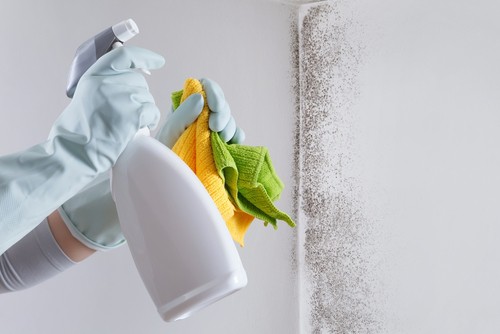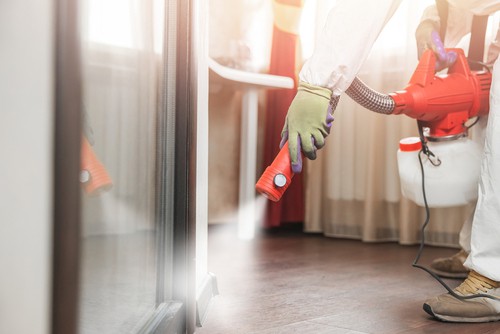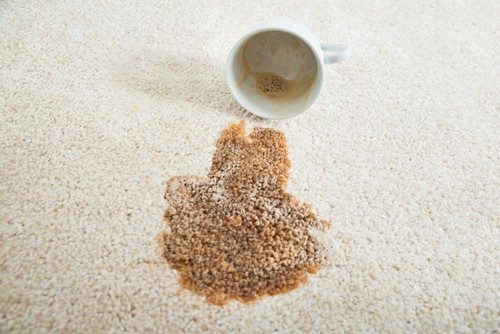
Office Cleaning and Pest Prevention: Keeping Unwanted Guests Away
August 28, 2023
Winning the Battle Against Mold and Mildew in Offices
October 18, 2023Cleaning and Disinfecting High-Traffic Areas in Offices
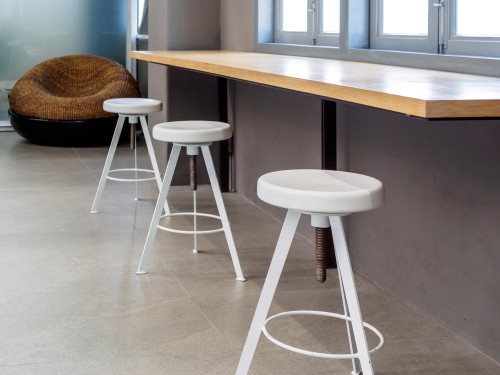
Cleaning and Disinfecting High-Traffic Areas in Offices
Cleaning and Disinfecting High-Traffic Areas in Offices. Maintaining a hygienic office environment is essential for the well-being of employees and visitors.
A clean workspace fosters productivity and reflects positively on your business.
High-traffic areas in offices are hotspots for germs and bacteria transmission. Addressing these areas is paramount to creating a safe and healthy workspace.
High-Traffic Areas in Office Spaces
Reception and Waiting Areas
Reception and waiting areas are often the first points of contact for visitors. Regular cleaning and disinfection ensure a positive first impression.
Conference Rooms and Meeting Spaces
Meeting areas witness frequent use, making them susceptible to germs. Effective cleaning here is crucial for productive and safe collaboration.
Office Kitchens and Breakrooms
Kitchen and break areas are communal spaces where cleanliness impacts employee health. Maintaining these spaces prevents contamination.
Elevators and Stairwells
Elevators and stairwells are confined spaces with high-touch surfaces. Proper cleaning and ventilation reduce the risk of disease transmission.
Restrooms and Washrooms
Restrooms are breeding grounds for germs. Thorough cleaning and sanitation in these areas protect employees and maintain a positive workplace environment.
The Importance of Cleaning and Disinfecting
Preventing the Spread of Germs
Cleaning and disinfecting high-traffic areas are effective measures to curb the spread of diseases, especially in densely populated offices.
Enhancing Employee Health and Well-being
A clean office contributes to employee health, reducing sick days and boosting overall well-being.
Maintaining a Professional Image
A well-maintained office conveys professionalism and trustworthiness to clients and partners.

Cleaning Supplies and Safety Precautions
Essential Cleaning Products
The right cleaning products, including disinfectants and sanitizers, are essential for effective sanitation.
Safety Measures
Implementing safety measures, such as providing protective gear for cleaning staff and ensuring proper ventilation, is crucial for employee well-being.
Establishing a Cleaning Routine
Frequency of Cleaning
Determining how often high-traffic areas should be cleaned is vital. Tailor cleaning schedules to the specific needs of each area.
Detailed Cleaning Checklist
A comprehensive cleaning checklist ensures that no surface or item is overlooked during cleaning and disinfection.
Creating a Cleaning Schedule
Developing a regular cleaning schedule streamlines maintenance efforts and helps maintain a consistently clean environment.
Reception and Waiting Areas
Cleaning High-Touch Surfaces
High-touch surfaces in reception areas, like door handles and counters, require frequent cleaning and disinfection.
Disinfecting Seating and Furniture
Regularly disinfecting seating and furniture ensures visitors have a safe and clean waiting place.
Floor Cleaning and Vacuuming
Floor maintenance, including vacuuming and spot cleaning, keeps reception areas pristine and inviting.
Conference Rooms and Meeting Spaces
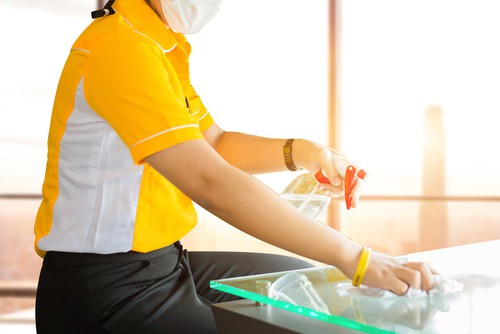
Cleaning Tables and Surfaces
Meeting tables and surfaces should be disinfected after each use to prevent cross-contamination.
Disinfecting Audio-Visual Equipment
To minimize risks, shared equipment, such as screens and remote controls, must be disinfected before and after use.
Upholstery Cleaning and Maintenance
Regular upholstery cleaning extends the life of chairs and seating while ensuring a clean and comfortable meeting environment.
Office Kitchens and Breakrooms
Cleaning Appliances and Countertops
Regularly cleaning appliances and countertops in kitchen areas is essential to prevent foodborne illnesses.
Disinfecting Shared Utensils and Appliances
Shared utensils and appliances should be thoroughly disinfected to reduce the risk of cross-contamination.
Managing Food Waste and Trash Bins
Proper waste management, including emptying trash bins regularly, prevents odors and pest infestations.
Elevators and Stairwells
Elevator Button and Handrail Cleaning
Elevator buttons and handrails are high-touch surfaces that require frequent disinfection to minimize transmission risks.
Stairwell Handrails and Landings
Stairwells need regular cleaning and maintenance, particularly handrails and landings.
Elevator and Stairwell Ventilation
Ensuring adequate ventilation in elevators and stairwells reduces the concentration of airborne pathogens.
Restrooms and Washrooms
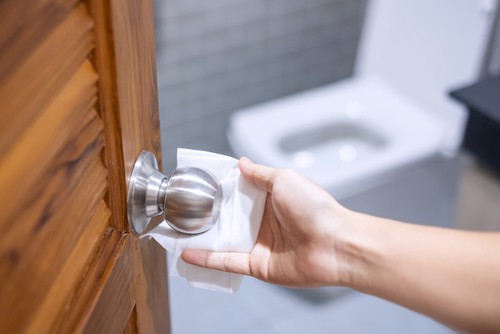
Toilet and Urinal Cleaning
To maintain hygiene, the toilet and urinal bowls should be thoroughly cleaned and disinfected.
Sink and Faucet Disinfection
Sinks and faucets are potential germ reservoirs; disinfection is crucial to prevent cross-contamination.
Restocking Essential Supplies
Always store restroom supplies, such as soap and paper towels, for visitor convenience.
Green Cleaning Practices
Eco-Friendly Cleaning Products
Embracing eco-friendly cleaning products reduces the environmental impact of office cleaning practices.
Reducing Chemical Footprint
Minimizing chemical use and waste in cleaning contributes to a healthier workplace and planet.
Waste Management and Recycling
Implementing proper waste management and recycling practices aligns with environmentally responsible cleaning.
Employee Hygiene and Office Policies
Promoting Good Hygiene Practices
Encouraging employees to maintain personal hygiene and cleanliness in shared spaces fosters a culture of cleanliness.
Communicating Cleaning Procedures
Transparent communication of cleaning protocols keeps employees informed and engaged in office hygiene efforts.
Encouraging Employee Responsibility
Empowering employees to take responsibility for their workspace cleanliness promotes a collective commitment to hygiene.
Monitoring and Quality Assurance
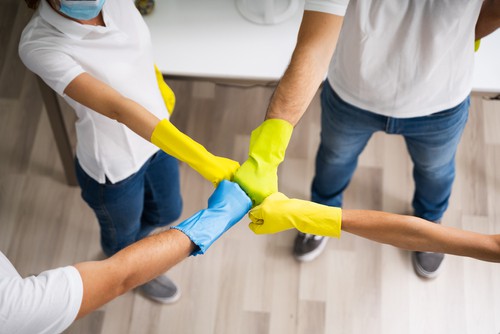
Regular Inspections
Conducting routine inspections ensures that cleaning standards are consistently met.
Employee Training and Evaluation
Training and evaluating cleaning staff enhance their efficiency and effectiveness.
Feedback and Improvement
Collecting feedback from employees and visitors helps identify areas for improvement in cleaning practices.
COVID-19 Considerations
Special Cleaning Protocols during Pandemics
During pandemics like COVID-19, additional cleaning protocols are necessary to minimize the spread of the virus.
Safe Handling of Shared Equipment
Implementing strict guidelines for handling shared equipment reduces the risk of virus transmission.
Employee Health and Safety Measures
Prioritizing employee health and safety through measures like temperature checks and remote work options is essential during pandemics.
FAQs – Frequently Asked Questions
How often should high-traffic areas be cleaned?
The frequency of cleaning high-traffic areas depends on foot traffic and specific area usage. Daily cleaning is recommended for heavily used spaces.
What are the best disinfectants for office spaces?
Effective disinfectants for offices include those approved by health authorities, like EPA-registered disinfectants, with proven effectiveness against pathogens.
Can I use homemade cleaning solutions in the office?
Homemade cleaning solutions can be used in some cases, but for effective disinfection, commercial disinfectants are recommended.
How can I encourage employees to maintain cleanliness in common areas?
Promote cleanliness through education, clear signage, and incentives for responsible behavior.
What additional precautions should be taken during COVID-19 outbreaks?
Additional precautions during pandemics include increased cleaning frequency, touchless fixtures, and promoting remote work when possible.
Are there professional cleaning services specializing in office hygiene?
Yes, professional cleaning services offer specialized office cleaning, ensuring high standards of hygiene and sanitation.
Cleaning and Disinfecting High-Traffic Areas in Offices – Conclusion
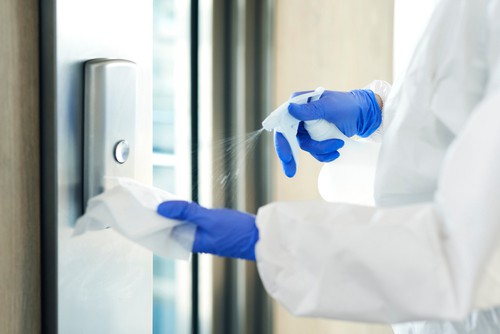
Well-maintained high-traffic office areas contribute to employee health, productivity, and a positive workspace image.
Prioritizing cleaning and disinfection in high-traffic areas fosters a work environment where employees thrive, and visitors feel welcome and safe.
Are you seeking professional and reliable office cleaning or disinfection services in Singapore? Contact us today!

